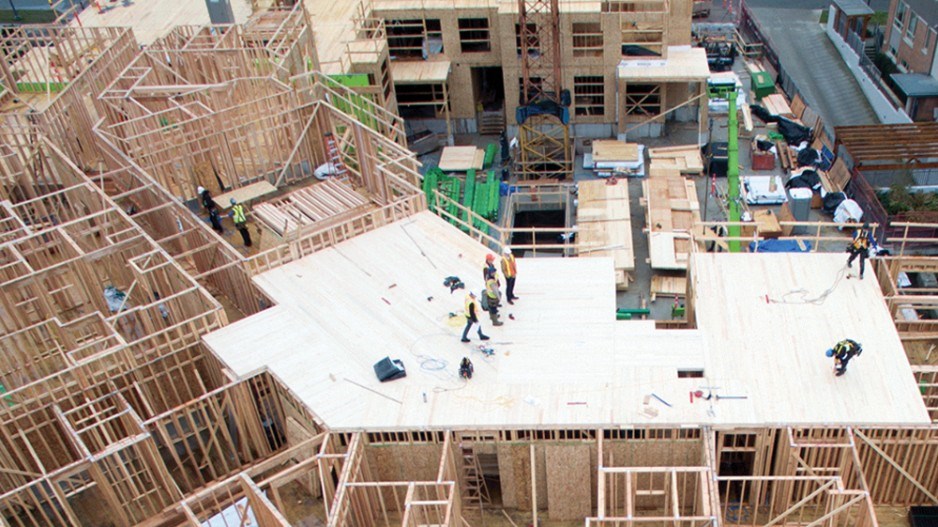Three provincial construction associations have joined forces to bring prompt payment legislation to B.C.
Advocating for prompt payment for years, the BC Construction Association (BCCA), Mechanical Contractors Association of BC (MCABC) and Electrical Contractors Association of BC (ECABC) have joined an industry working group made up of construction representatives. The working group, managed by the Ministry of the Attorney General, is providing industry expertise to help shape the legislation.
Formed after town hall meetings with ministry officials last fall, the group is closely watching similar legislation in Ontario, the U.S. and the U.K.
“B.C.’s construction workers, contractors — they deserve to get paid on time for the work they do,” said BCCA President Chris Atchison.
Atchison, who hopes to see the legislation tabled this fall, said prompt payment is one of BCCA’s top priorities, and the association has been working closely with ECABC, MCABC and more than 30 stakeholders to make it a reality.
The legislation would hold buyers accountable, reduce project costs and risk and open up billions of dollars in the B.C. economy, he said. While most businesses operate on payment schedules of 30 days, payment in the construction industry can take up to 100 days or longer.
“Let’s make the industry cash neutral – get them back to net 30 days,” he said.
Atchison said the pandemic has added to the need for prompt payment legislation. The industry – mostly small contractors with 20 or fewer employees – was designated essential throughout the pandemic.
“It’s been costly, with added safety protocols, fewer people allowed on site, staggered schedules, more people away sick.”
Atchison added that prompt payment would allow contractors to thrive by financing their businesses through cash flow.
“That makes it easier to invest, start new companies, train, hire more people, more equipment.”
Atchison said an “effective and fair system for arbitration” needs to be introduced, and the group is using Ontario’s prompt payment legislation as a model. Saskatchewan recently adopted prompt payment, Alberta plans to have it this summer, and other provinces are looking at developing similar legislation.
ECABC President Deborah Cahill said prompt payment is in the best interest of British Columbians because costs expended chasing down owed money get passed on to consumers. She said taxpayers pay more for large public projects like hospitals and schools when costs increase due to bridge financing.
Cahill said she’s hoping the new legislation will make the construction relationship process “far less confrontational.”
“Significant time and resources are often devoted by our members to chasing down payment, taking them away from running their business,” she said.
Prompt payment will also benefit workers through more training and job opportunities, career advancements and promotions, she said.
“In some cases, lack of legislation has meant bankruptcy for companies and local businesses. This legislation will provide stability for workers and the companies for which they work.”
MCABC CEO Kim Barbero called the legislation “the right thing to do.”
“We need prompt payment legislation now,” Barbero said. “Let’s stop talking about it.”
Sub-contractors and specialists often bear the brunt of risk and cost while waiting to be paid, which increases construction costs, affects employees who may lose their jobs and limits employers’ ability to hire additional workers and apprentices, she said.
“The inability to get paid in a timely manner really can, and has, forced contractors out of business. And the domino effect is devastating.… It trickles down to employees and their families.”
Prompt payment would also help maintain professional relationships, she said.
“The lack of prompt payment legislation has discouraged some contractors from even bidding on certain jobs because of past experiences.”
Relief or more red tape?
Not everyone is on board with the proposed legislation. Neil Moody, CEO of the Canadian Home Builders’ Association of BC (CHBA BC), said the organization opposes legislation that would impose payment terms and an adjudication process to settle disputes for residential construction work. Moody said it would add red tape and legal costs and would delay housing construction.
“It is not helpful to B.C.’s small and medium residential construction businesses who provide 200,000 jobs throughout the province and already are subject to compliance under the Builders Lien Act,” he said.
Having both a lien and prompt payment is “unnecessary and costly” and would create, “redundant, confusing processes for businesses to navigate,” according to Moody, who said meeting prompt payment terms and responding to adjudication would require businesses to have more staff.
“It also involves more fees and costs to hire counsel and experts if there are multiple, concurrent adjudications for one or more housing projects,” he said. “If there is a dispute, it is possible that adjudication and rebuttals could prevent housing projects from moving forward or stretch out project timelines.”
Part of the working group, CHBA BC plans to keep voicing its concerns, according to Moody, who urged the province to focus on streamlining the approval process for more housing.
“We do not believe there are substantive issues with payments within B.C.’s residential construction sector that warrant government attention and intervention at this time.” •




